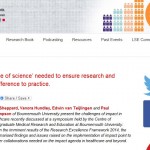Are journal impact factors a good indicator of quality?
Following the launch of the first BU Research Blog Poll, we received 28 responses to the above question which were split as follows:
| Yes – always | 2 |
| Yes – but in STEM disciplines only | 1 |
| Sometimes | 22 |
| No, never | 2 |
The majority of responses indicate that there may be some doubt about the usefulness of impact factors when used as a proxy for journal quality. This is perhaps because there are a number of factors that could affect a journal’s perceived quality that cannot be demonstrated through metrics alone. Also, the use of journal metrics like impact factors are not necessarily perceived as being robust enough yet to give an accurate indication of journal or article quality, hence HEFCE’s decision not to rely solely on metrics in the Research Excellence Framework (REF).
To continue the debate on this, do feel free to post a reply below, or suggest a topic for a future poll by responding to Julie’s original post. For more information about journal impact factors, have a look at the previous blog post on this subject.
 In the meantime, why not get involved in the current poll which can be accessed from the top right-hand side of the blog homepage – it will take just seconds to complete and will help shape the support offered to BU academics in the future.
In the meantime, why not get involved in the current poll which can be accessed from the top right-hand side of the blog homepage – it will take just seconds to complete and will help shape the support offered to BU academics in the future.
 Symposium Centre of Postgraduate Medical Research and Education on LSE Blog
Symposium Centre of Postgraduate Medical Research and Education on LSE Blog










 SPROUT: From Sustainable Research to Sustainable Research Lives
SPROUT: From Sustainable Research to Sustainable Research Lives BRIAN upgrade and new look
BRIAN upgrade and new look Seeing the fruits of your labour in Bangladesh
Seeing the fruits of your labour in Bangladesh Exploring Embodied Research: Body Map Storytelling Workshop & Research Seminar
Exploring Embodied Research: Body Map Storytelling Workshop & Research Seminar Marking a Milestone: The Swash Channel Wreck Book Launch
Marking a Milestone: The Swash Channel Wreck Book Launch ECR Funding Open Call: Research Culture & Community Grant – Application Deadline Friday 12 December
ECR Funding Open Call: Research Culture & Community Grant – Application Deadline Friday 12 December MSCA Postdoctoral Fellowships 2025 Call
MSCA Postdoctoral Fellowships 2025 Call ERC Advanced Grant 2025 Webinar
ERC Advanced Grant 2025 Webinar Update on UKRO services
Update on UKRO services European research project exploring use of ‘virtual twins’ to better manage metabolic associated fatty liver disease
European research project exploring use of ‘virtual twins’ to better manage metabolic associated fatty liver disease
No surprises on the poll. Although using impact factors as a soft proxy for journals can help some neophyte academics in choosing a journal outlet for their work, especially if particularly focused and ‘niche’, knowing the disciplinary area is the primary indicator and this comes from good academic mentorship, immersion in the discipline as well as considering impact factors.